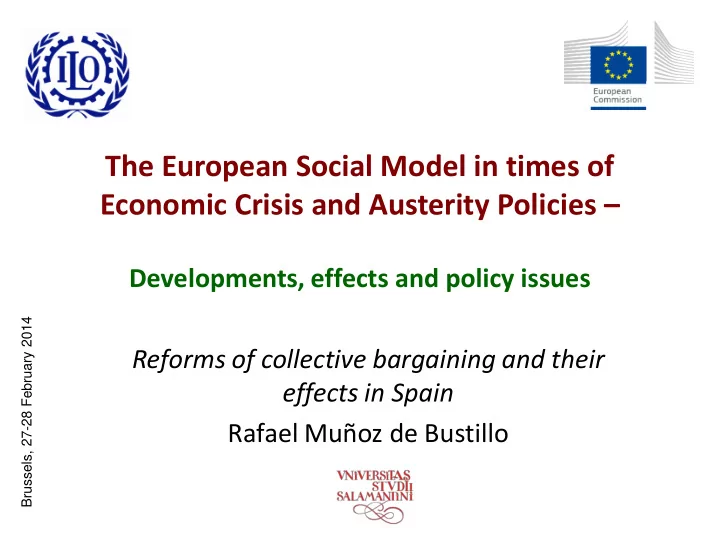

The European Social Model in times of Economic Crisis and Austerity Policies – Developments, effects and policy issues Brussels, 27-28 February 2014 Reforms of collective bargaining and their effects in Spain Rafael Muñoz de Bustillo
Background: the Great Recession in Spain • Average intensity in terms of GDP fall but the highest intensity of the EU in terms of employment destruction 0 GDP Employment -5 Percent change • Long duration (5 years) -7.6 -10 -15 • Massive unemployment -17.8 -20 (2008-2013)
Social dialogue before the crisis: • Low union affiliation rate (≈19 %) but high employee participation in workers ’ representatives elections every two years (around 67%). • High coverage of Collective Agreements (around 80% of employees). • Long tradition of social dialogue at national and regional levels. • Many sectorial-provincial agreements (as firms are very small; firms with less than 5 workers employ 50% of workers).
The crisis, fiscal consolidation and labour reform • Demise of the process of social dialogue in public administration. – Unnegotiated reduction of wages of public employees in 2010 (average -5%) . – Unilateral removal of the 14 th monthly pay in 2012. – Wage freeze the rest of years of the crisis + increase in working hours – Further wage reductions in specific regions (e.g. Catalonia). • Campaign of denigration of public employees and confrontational comparison of public (“ privileged ”) employees with private sector workers.
Trade Unions under siege • Strong campaign by media and the goverment against Trade Unions. • Elimination of existing agreements between TU and Public Administration to increase the number of TU hours in public administration (as contribution to their institutional role). • Reduction of subsidies to TU (including those linked to training actions). • TU pictured as something from the past and as an obstacle to employment growth.
Reform of collective agreements • Priority given to firm-level agreements (in a country of micro- firms?) • Reduction in the compulsory nature of collective agreements The reform allows firms to stop honouring the collective agreement when negative events occur (e.g., actual or forecasted loses, reduction of income or sales for more than two consecutive quarters, changes in the organization and changes in demand). • Limitation of the duration of CA after their expiry date (1 year).
Results • Postponement of collective bargaining (less incentives for firms to promptly negotiate agrements). • Increase of the number of firms opting out of CA. • Deterioration of working conditions . • Increase of labour and social conflicts.
Taken part in lawful public demonstration last 12 months in 2012 (%) Percent of adult population 10 15 20 25 30 0 5 Finland Source : Authors´analysis from European Social Survey 2012 (ESS6-2012 ed.1.2) Poland Netherland United Kingdom Slovenia Estonia Slovakia Denmark Russia Suiza Cyprus Belgium Bulgaria Kosovo Portugal Czech R. 6.9 Total Sweden Germany Norway Israel Ireland 17.4 Iceland 25.9 Spain
Recommend
More recommend